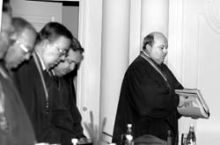It took the judges about six hours to hand down a ruling. Last Friday an emotional Anatoly Yarema, the Deputy Chairman of Ukraine’s Supreme Court, read out the court’s verdict for almost twenty minutes. The Supreme Court partially satisfied the complaint of Mykola Katerynchuk, the representative of presidential candidate Viktor Yushchenko, with respect to the Central Electoral Commission’s (CEC) decision to declare Viktor Yanukovych the winner. The court annulled what it considered the CEC’s unlawful decision on the results of the November 21 elections. The Supreme Court ruled that as a result of the vote rigging in the runoff, it was impossible to find out the true results of the election and therefore ordered the renewal of the two candidates’ rights and a rerun of the vote on a date calculated from December 5, as the law requires (i.e., on December 26). So Ukraine may finally learn the name of its new president before New Year’s Day. On the other hand, the court rejected the demand of Mr. Yushchenko’s team to recognize the winner of the first round as president-elect. The unprecedented hearing, which began on Monday, November 29, lasted for five days.
On the eve of the Supreme Court ruling, The Day asked some experts for their impressions of the televised hearing that millions of Ukrainians watched for a week. The experts also expressed their opinions about the importance of the court’s decision for Ukraine’s modern history.
ADHERING TO THE LETTER OR THE SPIRIT OF THE LAW?
“This kind of publicly televised Supreme Court session is a very important phenomenon, and to some extent it’s a new one for Ukraine. I can’t say it is entirely new because the courts have long been involved in the electoral process, but this is the first time on such a broad scale. The main thing is that for the first time the public was looking forward to a Supreme Court ruling. Still, in my view, there is also a problem here: somewhat overrated public expectations. What we have now is reciprocal legal nihilism, on the one hand, and belief in the omnipotence of the law, on the other. In this situation, though, it is important for those who will consider themselves the losing party respect the ruling to be passed. The overrated public expectations should not turn into the opposite after the ruling is announced. The very fact that the Supreme Court considered this case is not unusual: it is normal if democratic mechanisms of this kind are brought into play. What really matters is that these mechanisms remain democratic after the court hands down a ruling.
“I do not think that the open-door nature of this hearing is a major achievement of democracy because it seems to me this reflects certain pressure being exerted on the current events. On the other hand, though, it is perhaps correct that such undoubtedly crucial events become open. It is equally important that this openness not turn into an instrument of pressure on the court.
“I think both sides fielded very high-skilled experts, and the court will take into account their positions. From the vantage point of an uninitiated watcher, something may look spectacular but in fact this may be of little effect.”







